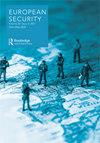Unpacking the Trump administration’s grand strategy in Europe: power maximisation, relative gains and sovereignty
IF 3.6
2区 社会学
Q1 AREA STUDIES
引用次数: 2
Abstract
ABSTRACT Observers continue to disagree on what, if anything, constituted the overarching logic guiding American foreign policy under the Trump administration, i.e. on how to describe Trump’s grand strategy. Rather than assessing the Trump administration’s statecraft on its own terms, however, most scholars fast forward to prescribing potential alternative approaches. To that end, they often cherry-pick different bits of empirical data to support their argument, without a clear theoretical or methodological justification. This is problematic, for the crucial question of whether Trump’s grand strategy was feasible and consistent with US interests cannot be properly answered without a shared baseline of what it precisely entails. In response, this article analyses factors from a variety of methodological perspectives – preferred modes of action, institutional commitments and discourses. An analysis of these factors in the context of Europe reveals that Trump pursued an onshore balancing strategy that built on three interrelated elements: power maximisation, relative gains and sovereignty. When transposing these elements to the European theatre, it appears that Trump's team pushed for a Europe that was divided, weak and relatively inconsequential as Washington sought to outcompete Beijing in order to retain global primacy.解读特朗普政府在欧洲的大战略:权力最大化、相对收益和主权
对于特朗普政府下指导美国外交政策的总体逻辑是什么(如果有的话),即如何描述特朗普的大战略,观察家们仍然存在分歧。然而,大多数学者并没有按照特朗普政府自己的方式来评估其治国方略,而是迅速提出了可能的替代方法。为此,他们经常挑选不同的经验数据来支持他们的论点,而没有明确的理论或方法证明。这是有问题的,因为特朗普的大战略是否可行、是否符合美国利益这一关键问题,如果没有对其具体要求的共同底线,就无法得到恰当回答。作为回应,本文从不同的方法论角度分析因素——偏好的行动模式、制度承诺和话语。在欧洲背景下对这些因素的分析表明,特朗普奉行的陆上平衡战略建立在三个相互关联的要素之上:权力最大化、相对收益和主权。当把这些因素转移到欧洲舞台上时,特朗普的团队似乎推动了一个分裂、软弱和相对无关紧要的欧洲,因为华盛顿试图超越北京,以保持全球主导地位。
本文章由计算机程序翻译,如有差异,请以英文原文为准。
求助全文
约1分钟内获得全文
求助全文

 求助内容:
求助内容: 应助结果提醒方式:
应助结果提醒方式:


